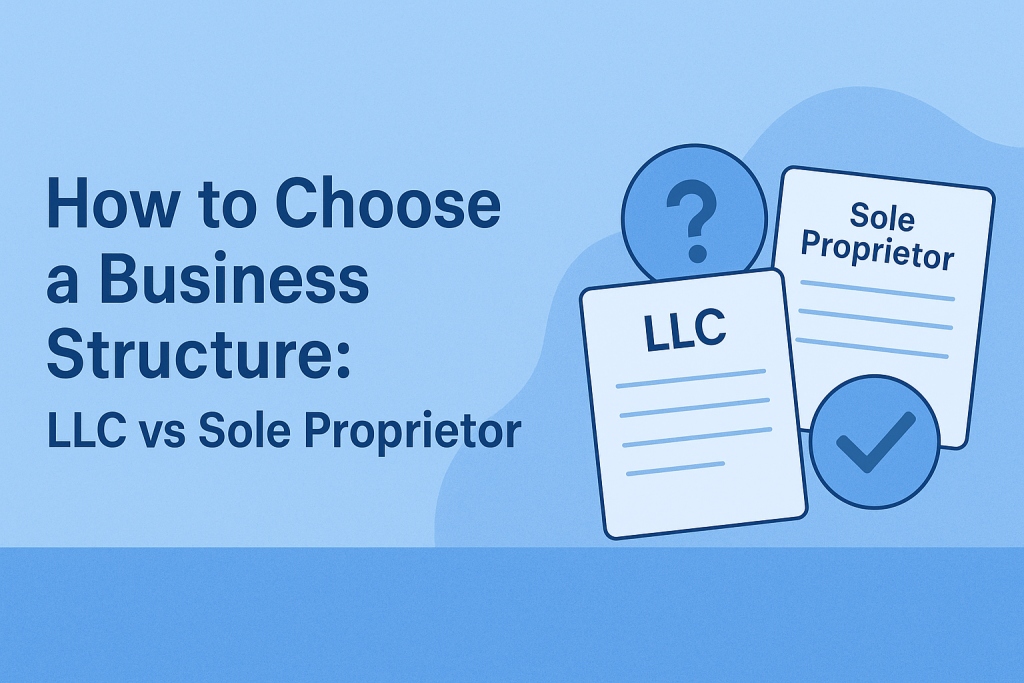Starting your own business is exciting—but before you launch your product, design a logo, or build a website, there’s one crucial decision to make: choosing the right business structure.
Two of the most common options for small businesses are the Limited Liability Company (LLC) and the Sole Proprietorship. Understanding the differences between these structures can help you make a smart, informed decision for your business.
In this guide, you’ll learn the key differences between LLCs and sole proprietorships, along with how to choose the one that fits your needs.
What Is a Sole Proprietorship?
A sole proprietorship is the simplest and most common business structure, especially for freelancers, solo entrepreneurs, and side hustlers.
Pros of a Sole Proprietorship
- Easy and inexpensive to form—no formal registration required in most cases
- Full control of the business stays with the owner
- Simple tax filing (business income is reported on your personal tax return)
Cons of a Sole Proprietorship
- No legal separation between you and your business—you’re personally liable for debts and lawsuits
- Harder to raise capital or get business credit
- Less credibility in some industries or with partners
What Is an LLC (Limited Liability Company)?
An LLC is a more formal business structure that protects your personal assets from business liabilities.
Pros of an LLC
- Limited liability protection—your personal finances are shielded from business debts
- More credibility and legitimacy in the eyes of banks, clients, and partners
- Flexible tax options (you can be taxed as a sole proprietor, partnership, or corporation)
Cons of an LLC
- Requires registration with your state, and may include filing fees
- Ongoing compliance (like annual reports, depending on your location)
- Slightly more complex tax setup
LLC vs Sole Proprietor: Key Differences
| Feature | Sole Proprietorship | LLC |
|---|---|---|
| Legal Protection | None | Personal asset protection |
| Taxation | Personal tax return | Flexible (pass-through or corporate) |
| Setup Process | Simple, often no registration | Requires state filing |
| Credibility | Informal | More professional |
| Cost | Low or free | Moderate (filing fees vary) |
How to Choose the Right Business Structure
1. How much risk is involved in your business?
If your business involves customer interactions, contracts, or physical products, an LLC offers a safety net against lawsuits or debts.
2. Do you plan to grow or stay small?
If you plan to stay solo, a sole proprietorship might be fine at the start. But if you’re looking to scale, hire employees, or seek funding, an LLC will make your business look more professional.
3. What’s your budget?
LLCs come with filing and maintenance costs, which vary by state. If you’re just testing a business idea with no risk, you might start as a sole proprietor and convert later.
Final Thoughts
Choosing between an LLC and a sole proprietorship depends on your goals, risk tolerance, and future plans.
If you want simplicity and full control, a sole proprietorship may work well—at least at the beginning. But if you want legal protection and room to grow, an LLC offers long-term benefits that can safeguard your personal finances.
Call to Action
👉 Bookmark this guide and subscribe to our newsletter for more beginner-friendly small business tips.
💬 Still unsure which structure is right for you? Drop your question in the comments below!


